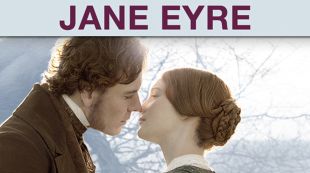/_derived_jpg_q90_584x800_m0/JaneEyre2011-Still1.jpg)
Brimming with gothic ambiance, exquisite cinematography, and deeply sinister undertones, Sin Nombre director Cary Fukunaga's take on author Charlotte Brontë's influential, oft-adapted novel almost plays like the most subtle Hammer horror film never produced, or a lush retelling of Jack Clayton's The Innocents, only stripped of its supernatural elements. And though there may not be enough menace in Jane Eyre to transform rabid horror fans into classic literature junkies, screenwriter Moira Buffini does an exceptional job of avoiding the literary genre's stuffy trappings -- allowing stars Mia Wasikowska and Michael Fassbender to instill their iconic characters with enough smoldering passion to perhaps win over a few period-piece converts.
Raised by her aunt Sarah (Sally Hawkins) after her parents die of typhus, young Jane Eyre (Amelia Clarkson) is later shipped off to a stark boarding school as the result of her perceived insolence, and suffers greatly at the hands of the cold, unusually strict administration. Upon turning 18 and completing her education, Jane (Mia Wasikowska) finds work as a governess for Adèle Varens (Romy Settbon Moore), the ward of Edward Fairfax Rochester (Michael Fassbender), master of Thornfield Hall. It doesn't take long for the young Adèle to warm to Jane, and upon returning home the charming Rochester, too, falls under the spell of his modest yet captivating governess. Later, he ends his courtship with the beautiful Blanche Ingram (Imogen Poots) in favor of proposing to Jane, who excitedly accepts. On what was supposed to be the happiest day of Jane's life, however, a scandalous secret is revealed, and the emotionally shattered governess takes flight. Subsequently taken in by kindly clergyman St. John (Jamie Bell) and his two sisters, Jane begins a new life as a teacher under an assumed name. But her passion for Rochester still burns bright, prompting Jane to make a life-altering decision after learning a crucial secret about her own family.
/_derived_jpg_q90_584x800_m0/JaneEyre2011-Still3.jpg)
Adapting the classics can be a daunting endeavor, especially when -- as is the case with Jane Eyre -- it starts to feel like they've been flogged to death on stage, television, and the big screen. Yet despite the fact that Fukunaga and Buffini chose to go literal with their version of the story rather than adapting it into a new setting or context, this version still possesses the power to resonate thanks in large part to a well-structured screenplay, which immediately gives us a distinct impression of Jane as it plunges us headlong into her deeply troubled childhood. Young Amelia Clarkson does an exceptional job of conveying Jane's burning intensity as she holds her own against Mrs. Reed and suffers extreme humiliation after being shipped off to a grim boarding school, and the character's transition into adulthood is virtually seamless thanks to a keen combination of scripting and direction. The set, costume, and production design are stunning throughout, with Adriano Goldman's rich cinematography bathing it all in lush shadows that give the entire film an alluring, darkly seductive quality.
Likewise, Wasikowska and Fassbender both have a pronounced talent for delivering period dialogue in an incredibly naturalistic manner that doesn't place the viewer at a distance, and which conveys their swelling affections for one another in no uncertain terms; Jane's speech to Rochester preceding the marriage proposal at Thornfield Hall burns with a fury that most actresses would find difficult to express using even a contemporary tongue, and Fassbender does an exemplary job of matching her intensity at each and every turn. And though their characters are a bit more incidental in this version of the tale, Jamie Bell, Sally Hawkins, Judi Dench, and Valentina Cervi leave distinct impressions as well.
/_derived_jpg_q90_584x800_m0/JaneEyre2011-Still5.jpg)
For purists hoping for a more comprehensive version of the story, this abbreviated take on Jane Eyre may fall a bit short in certain respects; for those unfamiliar with the story yet still looking for a satisfying version that hasn't been stripped of its true soul, however, Fukunaga's take on Brontë's influential classic does not disappoint.
